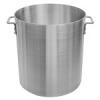We are in the baked goods business and have certain equipment that is dry cleaned. Our method (in short), is to scrape the dough off, clean with a solution and towel, then apply our quat sanitizer. The higher ups have decided to eliminate the cleaning solution and just dry clean (scrape) and sanitize. I recently joined the company so it seems to be common practice to make a change like this without proper validation, which I have to tackle. The other thing is they would like to apply oil (cooking oil) to the belts after the cleaning but the oil would sit there for a day. I have never heard of something like this and would appreciate any feedback in regards to the dry cleaning.
- Home
- Sponsors
- Forums
- Members ˅
- Resources ˅
- Files
- FAQ ˅
- Jobs
-
Webinars ˅
- Upcoming Food Safety Fridays
- Upcoming Hot Topics from Sponsors
- Recorded Food Safety Fridays
- Recorded Food Safety Essentials
- Recorded Hot Topics from Sponsors
- Food Safety Live 2013
- Food Safety Live 2014
- Food Safety Live 2015
- Food Safety Live 2016
- Food Safety Live 2017
- Food Safety Live 2018
- Food Safety Live 2019
- Food Safety Live 2020
- Food Safety Live 2021
- Training ˅
- Links
- Store ˅
- More













